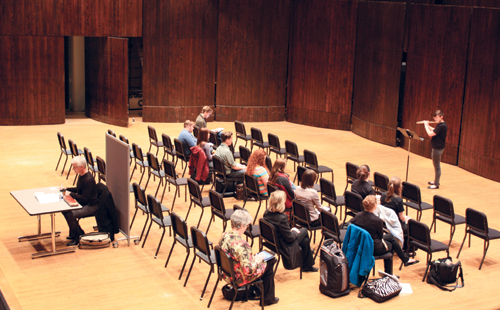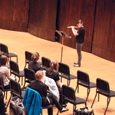
I frequently remind my students that the study of music is also a study for living life. Sometimes you win; sometimes you lose. Auditions and competitions are a part of musical life that inspire a greater work ethic and can provide specific goals and opportunities for continued growth. The process of learning and getting better is a life-long journey with ups and downs, wins and losses, and many opportunities to try again.
Throughout the time a flutist is my student, I help him or her face the possibilities of success and rejection. Of course success is usually easier to handle than rejection, but success is always built on a series of rejections. Losing does not mean that you are unworthy as a person. It means that at that particular moment in time someone else had a better day or fit the criteria of the audition or the competition better. I encourage students to get up and try again, be better prepared the next time, and learn from the experience. Together we explore how the learning and preparation process can be revised to achieve a better outcome by asking questions, including:
• Was the choice of repertoire appropriate?
• What went well and what could have been better?
• Did I play convincingly?
• Did I do my best?
• Did I make music?
• Was my practice routine useful?
Of course, no matter the outcome, a student is rewarded by simply doing it. I repeatedly let them know that I am very proud of them. I remind them that they have learned new literature well enough to make an audition recording and enter the audition or competition. Goals were set and achieved. Preparation concerts were given. Recording techniques were learned. Experience was gained. These are all win-win accomplishments.
I explain that the process of learning and preparing is the reward, not the outcome of the competition or audition. I think opportunities that encourage and inspire students to do their best work are worthwhile activities. I encourage students to present their best work possible without the expectation of winning. Entering a competition is an opportunity, not a mandate to win.
Accepting the challenge and persistently working towards a goal is the beginning of the journey. Learning to prepare every aspect of a performance or audition is invigorating, challenging, and fun. What could be better than accepting a challenge and then rising to meet it? Setting high expectations increases confidence and enables students to achieve more than they thought they could – and each time, the level of making music will become more satisfying.
In the early stages of preparation students try to learn everything about the piece including historical context and style. Listen to recordings of other flutists playing the repertoire. Contrary to some thinking, I believe that listening encourages greater creativity. We all know that there isn’t just one way to play a piece. We discuss phrasing, intonation, articulation, vibrato, and on and on, discovering what fun it is to strive to bring a composer’s voice to life. I help them discover that the act of music-making is very powerful and meaningful and in an audition or competition to judge yourself not by whether you win or lose but by the quality of your music-making and the joy with which you undertook the process.






